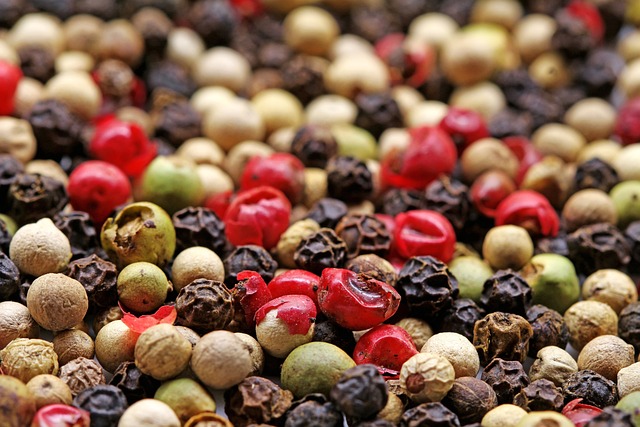Contents
Enhancing Digestion with Black Pepper: The Science Behind it
Black pepper, commonly used as a culinary spice, has proven to be more than just a flavor enhancer. Research suggests that black pepper can play a significant role in enhancing digestion and promoting overall gut health.
The key component in black pepper responsible for its digestive benefits is called piperine. Piperine stimulates the release of digestive enzymes in the pancreas, which aids in the breakdown of food and the absorption of nutrients.
Studies have shown that piperine can help improve digestion by increasing the production of gastric juices in the stomach. This enhances the digestion process, leading to better nutrient absorption and reduced digestive discomfort.
Furthermore, black pepper has been found to have antioxidant and anti-inflammatory properties. These properties can help soothe digestive inflammation and alleviate symptoms of digestive disorders such as bloating, gas, and indigestion.
It is important to note that while black pepper can be beneficial for digestion, it should be consumed in moderation. Excessive consumption of black pepper may cause irritation to the stomach lining in some individuals.
Incorporating black pepper into your daily meals can be a simple and natural way to improve digestion. Sprinkle freshly ground black pepper on your salads, soups, or main dishes to enjoy its digestive benefits.
In conclusion, black pepper, with its active component piperine, has been scientifically proven to enhance digestion. By stimulating the release of digestive enzymes and promoting the production of gastric juices, black pepper can aid in better nutrient absorption and reduce digestive discomfort. So why not spice up your meals with a dash of black pepper for a healthier digestive system?
Enhancing Digestion with Black Pepper: The Science Behind It
What is Black Pepper?
Black pepper, scientifically known as Piper nigrum, is a widely used spice that comes from the berries of the Piperaceae family of plants. It is native to India and has been used in traditional medicine for centuries.
How Does Black Pepper Enhance Digestion?
Black pepper is known for its ability to enhance digestion and improve gastrointestinal health. Several compounds present in black pepper contribute to these beneficial effects:
- Piperine: This active compound in black pepper is responsible for its pungent flavor and many of its beneficial properties. Piperine has been found to stimulate the production of digestive enzymes, promoting more efficient digestion.
- Antioxidants: Black pepper contains a variety of antioxidants that help protect the gastrointestinal system from oxidative damage and inflammation, allowing for optimal digestion.
- Stimulation of Hydrochloric Acid Production: Black pepper has been shown to stimulate the secretion of hydrochloric acid in the stomach, which is essential for the breakdown of food and nutrient absorption.
Scientific Studies Supporting the Benefits
Several studies have investigated the effects of black pepper on digestion:
- A study published in the Journal of Food Science found that piperine supplementation enhanced the activity of digestive enzymes in rats, leading to improved digestion and nutrient absorption.
- Another study conducted by researchers at the University of California found that black pepper and its active compound piperine exerted gastroprotective effects by reducing gastric acid secretion and enhancing the mucus lining in the stomach.
Ways to Incorporate Black Pepper into Your Diet
Here are some simple and delicious ways to include black pepper in your daily meals:
- Sprinkle freshly ground black pepper over salads, soups, and roasted vegetables.
- Add a pinch of black pepper to your morning smoothie or homemade juices.
- Use black pepper as a seasoning for marinades and meat rubs.
- Combine black pepper with other spices to create flavorful spice blends for curries and stir-fries.
Conclusion
Black pepper is a versatile spice that not only enhances the taste of your meals but also offers various digestive benefits. Its active compound, piperine, stimulates digestive enzymes, protects the gastrointestinal system, and promotes the production of hydrochloric acid. Incorporating black pepper into your diet is an easy way to support optimal digestion and overall gut health.
For more information on the benefits of black pepper and other natural remedies, feel free to check out our comprehensive guide.
Frequently Asked Questions: Enhancing Digestion with Black Pepper
What is the science behind black pepper enhancing digestion?
Black pepper contains a compound called piperine, which is responsible for its distinct taste and various health benefits. Piperine stimulates the production of digestive enzymes in the pancreas, improving digestion. It also enhances the absorption of nutrients by increasing the bioavailability of certain compounds.
How does black pepper aid digestion?
Black pepper stimulates the secretion of hydrochloric acid in the stomach, which is crucial for breaking down proteins and other food components. This increased acid production aids in the digestion of carbohydrates, fats, and proteins, leading to better nutrient absorption and reduced bloating.
Can black pepper help with digestive disorders?
While black pepper can be beneficial for many individuals in improving digestion, it is important to note that those with specific digestive disorders should consult their healthcare provider before consuming black pepper in large quantities. Certain conditions like gastroesophageal reflux disease (GERD) or gastritis may worsen with excessive consumption of black pepper.
How much black pepper should be consumed for enhanced digestion?
There is no specific recommended dosage for consuming black pepper for improved digestion. It is generally safe to incorporate moderate amounts of black pepper into your meals. However, individual tolerance may vary, and it is always advisable to listen to your body and make adjustments accordingly.
Can black pepper be consumed by everyone?
Black pepper is generally safe for consumption by most individuals. However, it may cause an allergic reaction in some people. If you experience any adverse symptoms after consuming black pepper, such as itching, rash, or difficulty breathing, seek medical attention immediately.
How Black Pepper Enhances Digestion
Black pepper is a commonly used spice in various cuisines around the world. Not only does it add flavor to dishes, but it also offers several health benefits, including aiding digestion.
The Role of Black Pepper in Digestive Health
Black pepper contains a compound called piperine, which is responsible for its distinctive taste and its potential digestive benefits. Piperine stimulates the production of digestive enzymes in the pancreas, which enhance the digestive process.
Furthermore, this compound helps increase the bioavailability of certain nutrients in the body, such as turmeric and curcumin, which can also support digestion.
Black Pepper as a Natural Remedy for Indigestion
If you often experience indigestion or digestive discomfort, incorporating black pepper into your meals may provide relief. It acts as a carminative, which means it helps reduce gas and bloating.
Additionally, black pepper has antimicrobial properties that can inhibit the growth of harmful bacteria in the gut. This can contribute to a healthier digestive system overall.
Using Black Pepper in Cooking
To benefit from black pepper’s digestive properties, it’s important to use it properly in your cooking. For optimal results, try to use freshly ground black pepper instead of pre-ground options, as it retains more of its essential oils.
Consider adding black pepper to savory dishes, soups, stews, or even hot beverages like ginger tea. Be mindful of your personal tolerance and consult a healthcare professional if you have any concerns.
For further information about black pepper, you can visit the Black Pepper Wikipedia page.
Enhancing Digestion with Black Pepper: The Science Behind it
Summary:
- Black pepper has been traditionally used to improve digestion.
- Active compound in black pepper, called piperine, increases the secretion of digestive enzymes.
- Piperine also enhances nutrient absorption in the intestines.
- Black pepper can alleviate digestive issues such as flatulence and bloating.
- Scientific studies suggest black pepper’s potential in preventing gastrointestinal disorders.








































